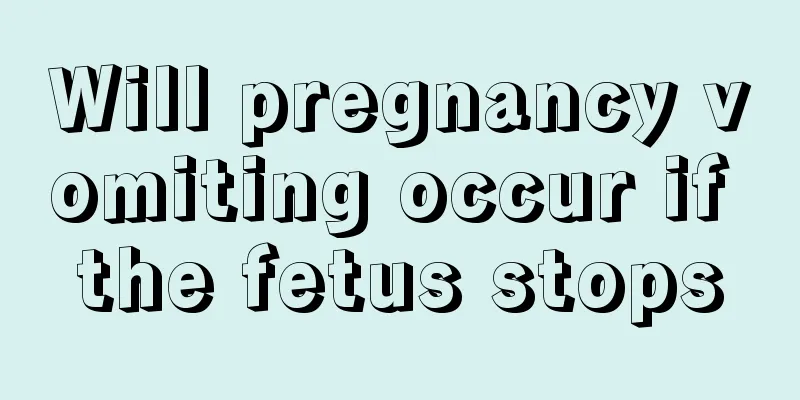Will pregnancy vomiting occur if the fetus stops

|
Generally speaking, if the fetus stops growing, morning sickness will not occur, because the pregnancy has stopped, so the symptoms of pregnancy will also disappear. If morning sickness occurs after miscarriage, you should seek medical attention and treatment promptly to avoid physical discomfort caused by other diseases. The cause needs to be identified as soon as possible. Why do I vomit after my baby stops growing? 1. The blood HCG value has not yet dropped: morning sickness is related to the increase in blood HCG value after pregnancy. After the fetus stops growing, the blood HCG level will not drop immediately, but it will take some time to drop to normal values. Therefore, there may be symptoms of morning sickness when the fetus stops growing. 2. Vomiting caused by disease: There are many reasons that lead to fetal arrest during pregnancy. In addition to abnormalities in the embryo itself, if the pregnant woman has diseases such as hyperprolactinemia, abnormal thyroid function, and diabetes, it will cause luteal insufficiency, leading to fetal arrest. These illnesses may also cause vomiting. What are the symptoms of fetal arrest? If the early pregnancy reaction suddenly disappears and the embryo stops developing, all pregnancy reactions of the pregnant woman will gradually disappear. First of all, there will be no more early pregnancy reactions such as nausea and vomiting, and the feeling of breast swelling will also be reduced. If the examination finds that the uterus is no longer growing, the pregnant woman is losing weight. Vaginal bleeding After the fetus stops moving, the pregnant woman's body will undergo a series of changes to facilitate the excretion of the fetus, which may cause vaginal bleeding. Some pregnant women not only have symptoms of vaginal bleeding, but also often have brown or dark red bloody leucorrhea. Expectant mothers with abdominal pain and fetal arrest may also experience lower abdominal pain. When they go to the hospital for examination, they may find that the fetal heartbeat has disappeared. If pregnant mothers are still vomiting after fetal arrest, it is recommended that you go to some regular, public tertiary hospitals for examination to avoid worsening of the condition. If pregnant mothers show symptoms of fetal arrest, they should go to the hospital immediately for B-ultrasound and blood HCG tests to confirm the fetal arrest and then undergo surgery. After the operation, mothers must cooperate with the doctor to recover. |
<<: Immunotherapy for fetal demise
>>: Causes of multiple miscarriages
Recommend
How long does it take for menstruation to end before ovulation and pregnancy rate are high?
Nowadays, many women are unable to conceive and c...
What are the ingredients for deep-fried skewers? What oil is used for deep-fried skewers?
Fried skewers are made by deep-frying a lot of me...
What is the ovulation day in a 30-day menstrual cycle?
Ovulation occurs about 14 days before the next me...
Why are the boundaries of breast nodules not clear?
There are many reasons that can cause endocrine d...
I feel shortness of breath during my fourth month of pregnancy.
If a pregnant woman experiences a symptom where h...
The fastest way to fart after a caesarean section
Farting is a normal phenomenon that happens to ea...
What are the adverse reactions after IUD insertion?
IUD insertion is a common contraceptive method th...
Why do women like to cross their legs?
Many girls prefer to cross their legs because it ...
Girls feel nauseous and want to vomit every night
Chest tightness, shortness of breath, dizziness, ...
Chinese Medicine Half Monthly Talk | Trichosanthes kirilowii
· Interesting stories · Luǒ, pronounced the same ...
Why is it more difficult to have sex during a normal delivery?
Most female friends are resistant to their first ...
The efficacy of gynecological Qianjin gel
Gynecological Qianjin Capsules are over-the-count...









